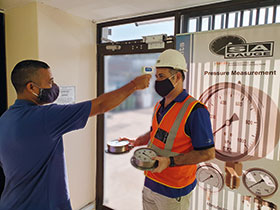

If you have not already had your temperature taken before entering a public building, there is a good chance you soon will. It has become an iconic image of the coronavirus outbreak worldwide: a masked person aiming a non-contact infrared thermometer gun at the forehead of another masked person to screen for signs of elevated body temperature associated with fever.
The expectation is that early detection will enable preventive action to be taken to stop the virus from infecting staff and customers, and damaging businesses. Healthy core body temperature is considered to be between 36°C and 37,3°C and people with a temperature of 38°C and higher are generally considered a risk and should be referred for further testing. This small margin of error requires accurate measurement to be effective, according to Chris du Plessis of SA Gauge, a local manufacturer of pressure and temperature instrumentation.
As demand for these thermometers has increased, it has resulted in a flooding of the South African market with many different brands, imported by companies or individuals often with limited or no experience regarding the quality and accuracy requirements, or the know-how to service and calibrate these instruments.
Calibrate to reduce the uncertainty of the measurement
Many of these forehead thermometers used on the front lines of the fight against the coronavirus are found to be inaccurate. “To avoid a false sense of security and to maximise the value that these thermometers could add to the fight against the virus, a calibration certificate issued by a reputable local company would minimise the risks associated with the use of an inaccurate thermometer,” explains du Plessis.
Operator training essential
Although widely used in varying environmental conditions for temperature screening of people, these non-contact thermometers were typically designed for indoor use by trained personnel for quick temperature screening of subjects in a controlled environment.
To cope with the sudden demand, operator training is often rushed or wholly inadequate, increasing the risk of false measurements. Sudden changes in environmental temperature could further influence the measurement validity. Operators should receive adequate training in the use of the thermometers, as the instruments should be allowed to acclimatise to the working environment before use, indoors or outdoors.
Practical considerations when taking a temperature
Infrared arterial temperature is measured by aiming the infrared thermometer near the centre of the forehead, holding it straight and steady, normally between 3 cm to 5 cm away from the person, and pressing the measurement button to display the forehead temperature. If in doubt, allow 5 seconds between measurements.
Forehead temperature is lower than core temperature, and clinical forehead infrared thermometers use a mathematical algorithm to convert the temperature taken from the forehead to display an equivalent core temperature.
Normal forehead temperature can vary significantly depending on your environment (indoors or outdoors), exercise, hair or make-up on the forehead, perspiration, direct heat or air conditioning, spicy food, as well as using fever reducing medication, etc.
Maintenance and calibration
Moisture, a dirty lens, battery condition, and careless handling or dropping of the instrument could influence measurements. To remain confident that the steps taken and monies spent by companies to fight the coronavirus adds value to their efforts, du Plessis recommends periodic servicing and calibration of these instruments by reputable companies.
SA Gauge offers a two-hour turnaround time for such a service. Thermometers dropped off by 10:00 am can be collected by lunchtime, ready for the afternoon rush. After-hours calibration can also be arranged.
Why measure at all if you are not going to be sure of the results? SA Gauges’ calibration laboratory ensures internationally traceable accuracies through its ISO/IEC 17025:2017 accreditation by the South African National Accreditation System.
| Tel: | +27 31 579 2216 |
| Email: | [email protected] |
| www: | www.sagauge.com |
| Articles: | More information and articles about SA Gauge |

© Technews Publishing (Pty) Ltd | All Rights Reserved